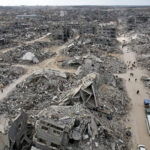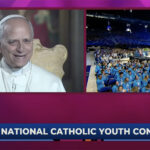(RNS) — When you take your tux to the dry cleaners after a big state banquet, and you notice there is a blood stain on the cuff, do you have to pay extra for them to get it out?
I’m asking because the White House held a black-tie dinner for Saudi Crown Prince Mohammed bin Salman. The guest of honor was a man whom the CIA concluded ordered the cold-blooded, bone-saw murder of journalist Jamal Khashoggi.
Seated in the room were some of the most influential Jewish business leaders and philanthropists of our generation, including: Stephen Schwarzman, CEO of Blackstone; Josh Harris, managing partner of the Washington Commanders; Bill Ackman, CEO of Pershing Square Capital Management; Neri Oxman, an American-Israeli designer; Marc Benioff, CEO of Salesforce; Alex Karp, CEO of Palantir Technologies; Albert Bourla, CEO of Pfizer; and David Ellison, CEO of Paramount Skydance.
These CEOs, investors and power brokers were present because they run empires — financial, technological and cultural. One is the child of Holocaust survivors, and many are extremely generous to worthy Jewish causes.
Did they shake Prince Mohammed’s bloody hand?
I understand and support diplomacy, geopolitical strategy and the necessity of normalization between Israel and Saudi Arabia. And some might say the aforementioned A-listers were not there “as Jews.” They were simply there, as my parents would have said, as machers, or important people.
That begs a larger question: When identifiable Jews show up, can they ever not show up as Jews? And if they show up as Jews, can they ever not ask themselves questions like, is there a cost to standing too close to power that has blood on its hands? Is there a point at which access becomes complicity? And, when Jews forget the value of moral distance, what are we losing?
This moment did not emerge from a vacuum. As Chuck Freilich, the former Israeli deputy national security adviser, pointed out in eJewishPhilanthropy, we are witnessing a generational shift in American Jewish influence.
In 1981, the organized American Jewish community mobilized ferociously to fight the sale of surveillance aircrafts to Saudi Arabia. Every major Jewish organization was engaged. They ultimately lost, but they extracted a lasting victory: the U.S. commitment to Israel’s “qualitative military edge,” a pledge later codified in law.
That was what communal power looked like. But today? We have a proposed sale of F-35 stealth fighters to Saudi Arabia, which the Israeli military has warned would potentially threaten its regional air superiority and the country’s security. And Jewish leaders are still dining with Saudi Arabia’s murderous ruler and the American president together.
As Judah Ari Gross writes in eJewishPhilanthropy:
The American Jewish institutional power that was far more potent in 1981 has been supplanted by the influence of individual American Jews, including those in attendance at last night’s White House dinner. “For Jewish businesspeople to have connections with the Saudis is not only not problematic, they can be a bridge,” Freilich said.
However, Freilich warned that while they can have an influence on geopolitical events, these Jewish business leaders are inherently constrained and are not a sufficient substitute. “Sure, they have clout, but they need to use it judiciously,” he said. That is why American Jews need to have a “really strong lobby,” Freilich said. “They don’t have the power that they once did, and that’s a real problem.
What did it mean for those Jewish leaders to be present in the White House dining room at the side of a ruler whose hands are stained by atrocity? What did it mean for the memory of Khashoggi? What will it mean for our children, who will learn that the business titans of their community dined in the presence of a man who silenced a dissident with a bone saw?
What did it mean for our ancestors, who taught us — through Torah, through history, through our very blood — that Jewish dignity is bound up with the refusal to bow before cruelty?
I am not naïve. I have binged “The Diplomat” on Netflix. I know international relations require engagement with unsavory actors. Diplomacy is not a seminar in moral philosophy.
But, still, there is a price, or at least a question. Have we become so enamored with access — to influence, wealth and power — that we have neglected the very old Jewish instinct that is the courage to say no? Or at least have hesitation, second thoughts or conscience? If we cannot ask for that, then, as Jews, what are we doing in the world?
Who is my hero in this story of proximity to power? Mary Bruce of ABC News. She was among the reporters let into the Oval Office to question the president and Prince Mohammed. She asked Trump whether it was appropriate for his family to be doing business in Saudi Arabia while he was president. Then, she asked the prince:
Your royal highness, the U.S. intelligence concluded that you orchestrated the brutal murder of a journalist — 9/11 families are furious that you are here in the Oval Office. Why should Americans trust you? And the same to you, Mr. President.
In response, Trump said, “You don’t have to embarrass our guest by asking a question like that.” He also later called her question, “a horrible, insubordinate, and just a terrible question.”
But in that moment, she was not just speaking for herself. The biblical prophets Nathan, who castigated King David, and Elijah, who castigated King Ahab, were speaking through her lips.
We need more of that. And we need well-placed Jews to try some of it as well.
If we cannot speak honestly when we stand too close to power that kills, then our silence is not strategy. It is surrender.
Before the next invitation arrives, let us think about this a little bit more clearly.



